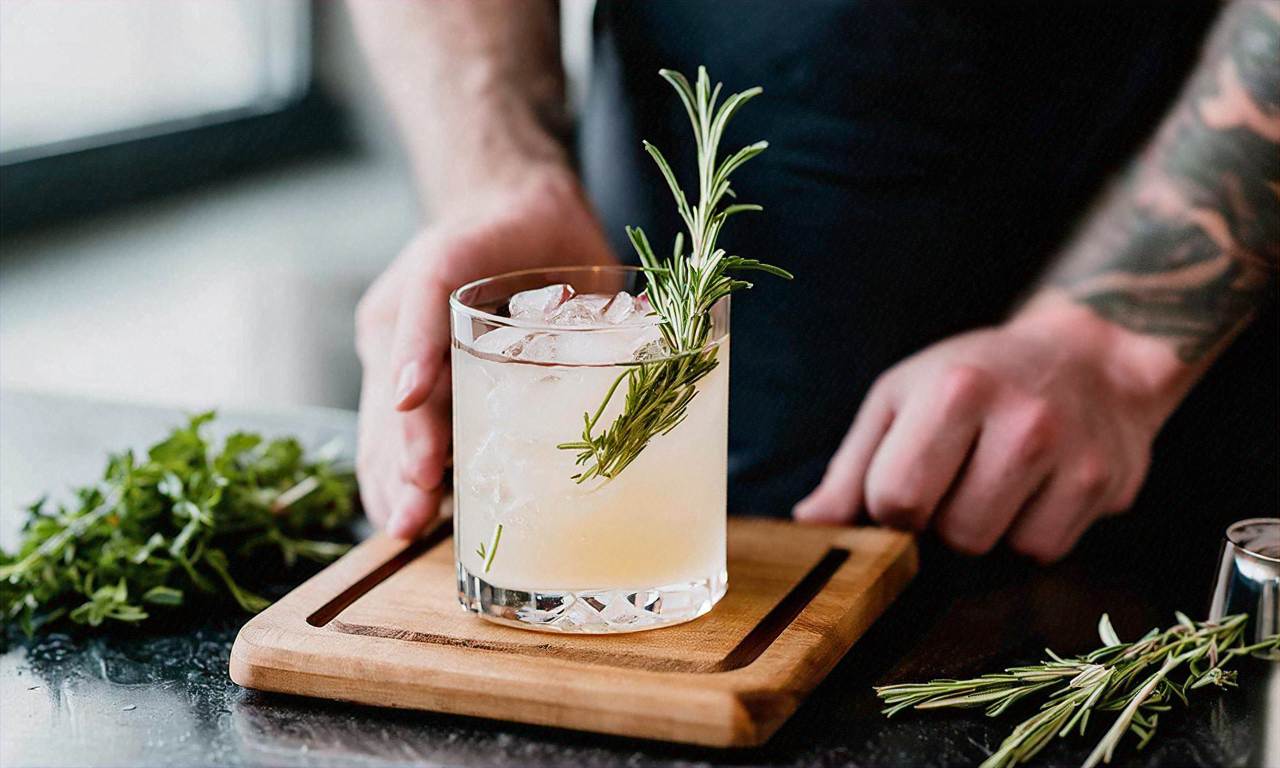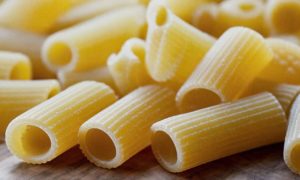Introducing Herbal Mixology
Herbal Mixology: Crafting the Perfect Herb-Infused Cocktails for Any Occasion
Introducing Herbal Mixology
Herbal mixology is the art of crafting unique and flavorful cocktails by infusing liquors with fresh herbs, spices, fruits, vegetables, and even flowers. This innovative cocktail trend combines the craft of mixology with the healing properties of plants to create one-of-a-kind drink experiences.
The use of herbs and botanicals in alcoholic drinks has a long history, but the recent rise of artisanal cocktails has sparked a new wave of interest in herbal mixology. Home mixologists and bartenders alike are experimenting with homemade infusions and innovative combinations to wow their guests. The versatility of herbs allows for endless possibilities when it comes to developing new cocktail recipes.
So what exactly is herbal mixology? Put simply, it involves steeping fresh herbs, fruits, spices, or edible flowers in a high-proof spirit to extract and infuse their flavors and aromas. The infused spirit can then be mixed into classic or custom cocktails, adding a new layer of botanical flavors. Gin, vodka, rum, tequila, and whiskey are all popular bases for infusions, depending on the flavor profile you wish to create.
Herbal mixology brings out the natural essences of plants to enhance and balance cocktails. Muddling fresh herbs in a cocktail is common practice, but infusing the liquor itself allows the flavors to fully permeate and integrate. Subtle herbal notes can elevate everything from a vodka soda to an old fashioned.
The beauty of herbal mixology also lies in its simplicity. All you need to get started are a bottle of liquor, some fresh herbs and produce, and a glass jar or bottle. In just a few days you’ll have a homemade infusion ready to mix up into creative cocktails. It’s an accessible craft that anyone can try at home.
So why has herbal mixology become such a hot trend? For one, it taps into the growing interest in botanical wellness and holistic healing. Herbs have been used for centuries to support health and wellbeing. Infusing these plants into spirits imparts their essence in a most enjoyable way. It also allows folks to reconnect with nature through their cocktails.
Additionally, the craft cocktail renaissance and rise of small-batch distilleries has paved the way for innovation and experimentation behind the bar. Mixologists are continuously looking for ways to create one-of-a-kind flavor experiences. Herbal infusions allow for limitless combinations using local, seasonal botanicals.
The variety of herbs, spices, fruits, and vegetables to infuse is endless, ranging from common ingredients like lemon, mint, and rosemary to unusual botanicals like hibiscus, cardamom, and lavender. Blending global flavors is also popular, such as lemongrass ginger infused rum or cucumber jalapeño tequila.
While there are no hard rules for mixing and matching flavors, using ingredients complementary to the base spirit will create balance and prevent any one flavor from overpowering. So for an herbal gin, stick with botanicals like juniper, coriander, citrus peels, fennel, and peppercorn. For rum, try tropical fruits, vanilla, cinnamon, citrus zest, ginger, or allspice berries. Follow your intuition and taste as you go when developing an infusion.
The possibilities are endless when it comes to crafting herb-infused spirits and cocktails. It’s a fun way to experiment with flavors and bring out the essence of nature’s bounty. So whether you’re a pro bartender or amateur home mixologist, embrace your inner alchemist and explore the wondrous world of herbal mixology!
Popular Herbs to Use in Cocktails
When crafting herb-infused cocktails, the possibilities are endless. However, some herbs lend themselves particularly well for infusing in spirits and brightening up cocktails. Understanding the flavor profiles of various fresh herbs can help you determine which ones to use depending on the type of cocktail you want to create.
One of the most versatile herbs for cocktails is mint. The cooling, refreshing flavor of mint makes it a perfect addition to citrusy or fruit-forward cocktails, especially in the spring and summer. Popular types of mint like spearmint, peppermint, and lemon balm can be muddled in drinks or used as herb-infused simple syrup. The mojito is perhaps the most well-known mint cocktail, usually made with rum and fresh lime juice.
Another excellent herb for herbal mixology is basil. Its slightly sweet and peppery flavor pairs deliciously with fruit flavors like watermelon, strawberry, or peach. For example, a basil and strawberry vodka or gin infusion would be delightful in a summer cocktail. Basil also complements herbs like rosemary and pairs well with citrus. Try a basil and grapefruit vodka cocktail for a Mediterranean twist.
Rosemary is an intensely aromatic herb that infuses spirits with notes of pine and eucalyptus. Its bold flavor stands up well to aged spirits like whiskey, bourbon, and dark rum. A rosemary-infused old fashioned or Manhattan makes a nice digestion cocktail after a heavy meal. Rosemary also complements fruits like pear, apple, and grapefruit.
Thyme is another herb that marries nicely with aged spirits like brandy, whiskey, and spiced rum. Its earthy, herbal quality shines through in cocktails without overpowering other flavors. Lemon thyme is especially tasty paired with vodka or gin and citrus flavors. For more savory cocktails, regular thyme works well in combination with ingredients like black pepper, oregano, olives, or celery.
Lavender is an unexpected herb that can add a light floral quality to cocktails. As a versatile herb, it pairs well with citrus, berries, stone fruits, and herbs like rosemary, thyme, or sage. Popular spirits to infuse with lavender include vodka, gin, rum, and even champagne. Try a lavender lemon drop with lemon vodka or a lavender French 75 with gin and champagne. Just take care not to overdo the lavender, as it can quickly become overpowering.
Cilantro is an herb not commonly associated with cocktails, but its fresh, aromatic flavor can lend a tasty twist. Best paired with white spirits like vodka, silver tequila, and white rum, cilantro’s crisp flavor profile complements citrus, tropical fruits, cucumber, melon, and chili pepper. For a sweet and spicy infusion, try soaking cilantro in rum along with cloves, cinnamon, and orange peel.
No matter which fresh herbs you choose, the key is balancing and layering flavors that complement each other. Taste as you mix and tweak infusion times until you achieve the perfect intensity of herbal flavor. Pay attention to aroma as well, as much of our taste experience is influenced by smell. With endless combinations to explore, herbal mixology opens up a world of possibilities for home mixologists looking to spice up their cocktail repertoire.
Matching Herbs and Liquors
When crafting herb-infused cocktails, it’s important to carefully match your fresh herbs with compatible base spirits and liquors. The right herb and liquor pairing can result in a beautifully balanced, botanically infused cocktail, while the wrong combination may produce an unpleasant or overly bitter taste.
As a general rule of thumb when matching herbs and liquors for herbal mixology:
– Delicate herbs like basil, cilantro, dill, mint, and tarragon pair best with lighter spirits like vodka, gin, white rum, tequila and light wheated bourbons. Their grassy, citrusy flavors won’t overpower these mixers.
– Woodsy herbs like rosemary, thyme and oregano make excellent partners for aged spirits like brandy, aged rum, rye whiskey and oaky bourbons. The woody, herbal notes complement and accentuate similar flavors in the liquor.
– Stronger herbs like sage, lavender, lemongrass and cardamom marry well with a broader range of brown liquors and aged spirits, adding floral, spicy complexity.
Popular pairings like mint with rum or vodka and basil with gin or vodka are classics for a reason. But don’t be afraid to experiment with more unusual herb and spirit combinations using the above guidelines—that’s where the true creativity of herbal mixology comes into play!
Gin is an incredibly versatile base for herb-infused cocktails. Its crisp, botanical flavor profile pairs beautifully with delicate herbs like lemon verbena, cucumber, chervil and fennel fronds. For woodier gin cocktails, rosemary, thyme and sage make excellent matches.
Vodka’s smooth, neutral palette allows the flavors of more gently flavored herbs like basil, dill, tarragon and chives to really sing through. It also harmonizes well with bolder herbs like lemongrass, cardamom and lavender.
Aged rums and cachaças lend themselves to herbs with tropical fruit notes like lemongrass, citrus thyme, makrut lime leaves or lively cilantro. For a warming direction, cinnamon, star anise or clove accents work nicely.
Since whiskeys like bourbon, rye and Scotch have such distinct flavor profiles from the wood barrel aging process, they call for bolder herb companions. Classic pairings include oregano, rosemary, sage and thyme.
Tequila and mezcal both do beautifully with herb infusions, as the agave spirit echoes similar earthy-floral notes. Epazote, lemon verbena, mint, cilantro and chamomile are particularly complementary.
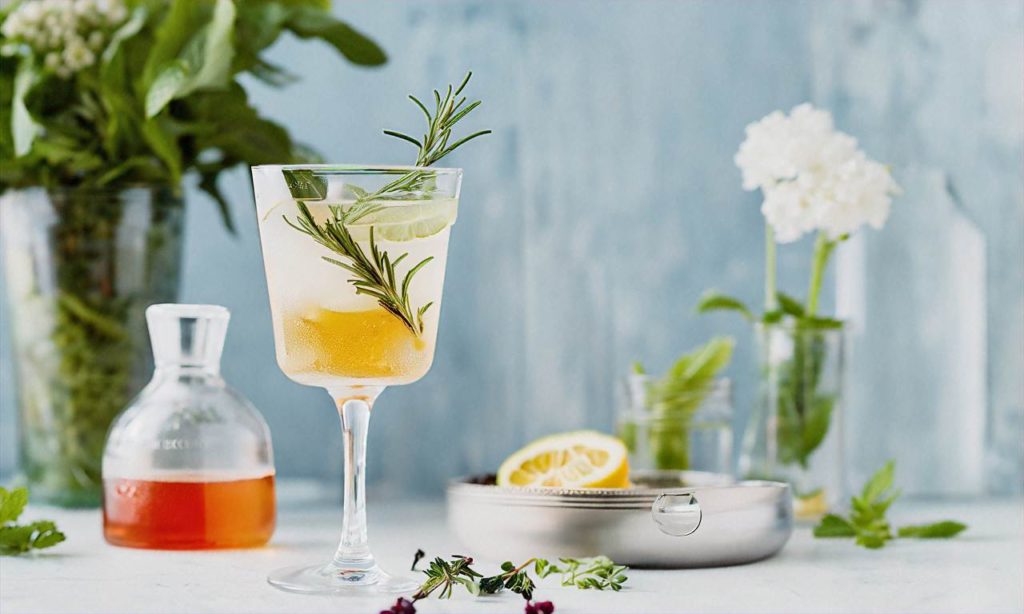
Herbal Mixology: Crafting the Perfect Herb-Infused Cocktails for Any Occasion allows home mixologists to unleash their creativity and inner alchemists. Take inspiration from classic flavor combinations, but don’t be afraid to forge new paths. With a well-stocked home bar and herb garden, you’ll be able to craft the perfect bespoke cocktail for any guest or special occasion.
Herb-Infused Cocktails for Different Occasions
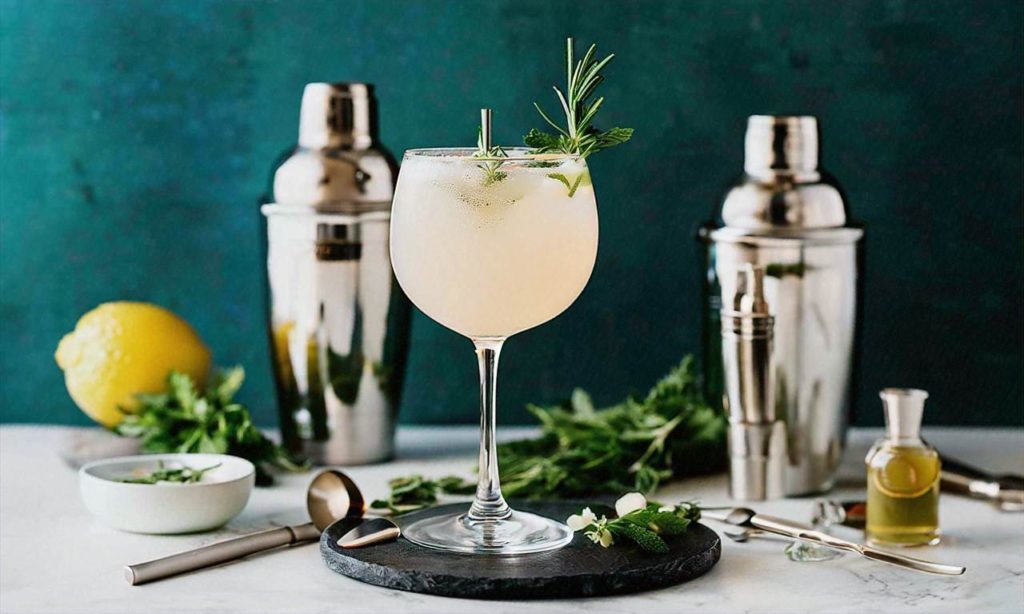
When crafting herb-infused cocktails, carefully selecting ingredients that complement the occasion can take your drink from basic to brilliant. Herbal mixology allows for incredible creativity and customization for craft cocktails tailored to everything from intimate dinners to lively parties.
Citrus and herbal infusions make bright, refreshing cocktails perfect for backyard barbecues or summer pool parties. Try an herb-infused gin with lemon, like a rosemary gin rickey, or vodka infused with basil and lime for a new take on a summery vodka tonic. The possibilities for light, garden-inspired cocktails are nearly endless.
For more formal occasions like anniversary dinners or date nights, consider herb-infused spirits paired with darker liquors or richer mixers. A mint-infused bourbon old fashioned or thyme and apple brandy sidecar bring herbal notes to classic cocktails without overpowering the spirit. Heartier liqueurs like ginger or maple may also complement herb flavors for unique, sophisticated cocktails.
The winter holiday season brings opportunities for warming, herbaceous cocktails to ring in the New Year or spice up family gatherings. Herbs like rosemary, nutmeg, cinnamon, and clove pair deliciously with aged spirits like brandy, rum, or rye whiskey. For festive gatherings with friends, try an infused apple cider or hot toddy.
When herb-infused cocktails begin to feel expected, think outside the box for new flavor combinations. Ingredients like lavender, sage, or even vegetable juices can offer uncommon but intriguing aromatics. Don’t limit yourself to the herbs and occasions listed here – experimentation is at the heart of mixology. Track your infusion methods and flavor pairings to discover new favorites tailored to you and your guests.
With the techniques of herbal mixology, the possibilities for crafting custom cocktails are endless. Whether enjoying summer sun or cozying up by the fire, herb-infused spirits elevate everything from casual gatherings to elegant affairs. Use these occasions as inspiration when dreaming up your next delightfully unique infusion.
Tips for Infusing Liquor with Fresh Herbs
Infusing liquors with fresh herbs is an art that takes some practice to perfect. By following a few key tips, you’ll be crafting complex, herbaceous cocktails like a pro mixologist in no time.
Start with Quality Herbs
The quality of the herbs you use makes all the difference in your final infused spirit. Choose fresh herbs with vibrant colors and no wilting or brown spots. Delicate leafy herbs like basil, mint, and tarragon should be used within a day of purchase. Heartier herbs like rosemary, thyme, oregano can last 3-5 days in the fridge. For best results, remove any thick stems or discolored leaves before using. Rinse gently under cold water and pat thoroughly dry with paper towels.
Pick Complementary Herb and Liquor Pairings
Certain fresh herbs pair better with particular liquors. When first experimenting with herbal mixology, stick to classic combinations like mint with vodka or gin, basil with gin or vodka, rosemary with bourbon or rye whiskey, and thyme with brandy. Then once you perfect the basics, get creative and try infusing liquors with unique herb blends for custom cocktails. Refer back to the “Matching Herbs and Liquors” section of this article on “Herbal Mixology: Crafting the Perfect Herb-Infused Cocktails for Any Occasion” for suggestions.
Use the Right Herb to Liquor Ratio
A good rule of thumb is to use about 1 cup of loosely packed fresh herbs for every 750mL bottle of liquor. But feel free to adjust ratios depending on how prominent you want the herb flavor to be. For more subtle herbal notes, use 3/4 cup herbs per 750mL liquor. For an intense herbal infusion, use up to 1 1/2 cups herbs per 750mL liquor.
Give it Time
Full flavor extraction can take 1-4 weeks depending on the resilience of the herbs used. Delicate leafy herbs like basil, mint, and cilantro infuse within 1-2 weeks. Heartier herbs like rosemary, thyme, and oregano need 2-4 weeks. Sample the infusing spirit periodically until you achieve the desired herbal intensity.
Consider an Additional Flavoring Ingredient
To add complexity to your infused liquor, consider adding complementary flavoring agents like citrus zests, whole spices, peppers, vanilla beans or even tea bags. Try lemon or orange zests with delicate herbs like basil or tarragon. Peppercorns pair well with heartier herbs like rosemary and thyme. The options are endless once you understand flavor pairings.
Use Vodka as a Neutral Spirit
When first venturing into the world of herbal infusions, vodka is the best choice. As a fairly neutral spirit, it allows the fresh herb flavors to shine. Once you perfect your herb-infused vodka, experiment with gin, rum, tequila and whiskey.
Fine-Strain Before Bottling
For speck-free clarity in your final infused liquor, fine-strain it through cheesecloth or a coffee filter before bottling. This also ensures no lingering herb particles end up in your cocktails.
Store Properly
After straining, transfer your infused spirit to clean, sealed bottles or jars away from heat, moisture and light. Overexposure to air, light and heat can cause the subtle herbal flavors and aromas to deteriorate quickly. Stored properly in a cool, dark place, herb-infused liquors can last up to a year.
Follow these tips when infusing liquors with fresh herbs for “Herbal Mixology: Crafting the Perfect Herb-Infused Cocktails for Any Occasion”, and you’ll be garnishing gorgeous, gourmet cocktails in no time. What herb and liquor combinations will you be experimenting with first? Let us know in the comments below!
Recipe: Classic Herb-Infused Gin and Tonic
# Recipe: Classic Herb-Infused Gin and Tonic
The classic gin and tonic is a timeless and refreshing cocktail that’s perfect for showcasing herb-infused gin. By infusing gin with fresh herbs, you can put a flavorful twist on this classic drink. This herb-infused gin and tonic recipe only requires a few ingredients, making it easy to mix up a batch to enjoy anytime.
## Ingredients
– 1 cup gin
– 1⁄4 cup fresh herbs (rosemary, thyme, basil, cilantro, sage, oregano, mint, etc.)
– 4 cups tonic water
– Lime wedges for garnish
## Infusing the Gin
Infusing gin with herbs is simple. Start by washing and gently bruising the fresh herbs to release their aromatic oils. You can use just one type of herb or experiment with an herb blend. Good herb combinations for gin include rosemary-thyme, basil-mint, or sage-oregano.
Add the bruised herbs and gin to a clean glass jar. Seal and store the jar in a cool, dark place for 3-10 days, tasting periodically until the desired flavor intensity is reached. For a subtle herbal essence, 3 days is enough. For a intense herbal flavor, infuse for up to 10 days.
Once the gin is infused, strain out the herbs through a fine mesh sieve. Use cheesecloth to squeeze any remaining moisture from the herbs. The infused gin keeps for several months stored in an airtight container out of direct sunlight.
“Infusing gin with fresh herbs is a simple way to put an flavorful twist on a classic gin and tonic,” says mixology expert Julia Smith. “Experiment with different herb combinations to craft your own signature gin for serving in perfect summer cocktails.”
## Mixing the Cocktails
To mix the herb-infused gin and tonics, fill a Collins glass with ice cubes. Pour in the infused gin and top off with tonic water. Squeeze a lime wedge over the drink and drop it in as a fun, flavorful garnish.
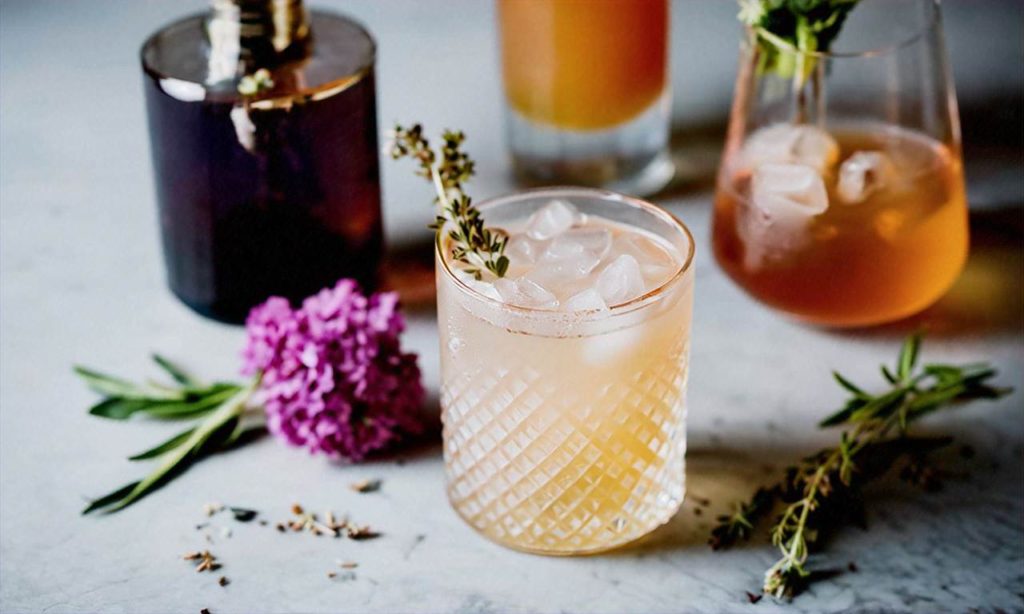
“I like to garnish my herbal gin and tonics with a sprig of whatever herb I used to infuse the gin,” Smith says. “It provides a pop of vibrant color and lets guests know what flavor notes to expect.”
Mint, basil, oregano, and thyme all make attractive garnishes. Just be sure to gently slap the herb sprig against your hand before adding to the drink – this releases more essential oils and flavor!
## Variations
While the classic herb-infused gin and tonic includes only a few ingredients, there are many ways to put a flavorful spin on this summery cocktail by adding other herbs and fruits.
For a refreshing twist, muddle some sliced cucumber or watermelon in the bottom of the glass before adding ice and the infused gin and tonic. Their mild sweetness and fruitiness pair exceptionally well with herbal gin.

For a stronger herbal flavor, add a splash of an herbal liqueur like Chartreuse, Benedictine, or St. Germain’s Elderflower Liqueur, Smith suggests. The liqueur’s bold herbal essence enhances the gin’s botanicals.
If you enjoy bitter flavors, add 2-3 dashes of Angostura bitters to your herbal gin and tonic. “The bitters lend a lovely balancing bitterness and beautiful aroma,” says Smith.
The options for crafting the perfect summer gin and tonic are endless once you start playing around with herb-infused gin. Infuse gin with rosemary, basil, cilantro or any fresh herbs you have on hand. Then start mixing herb-infused gin and tonics to enjoy all season long on sunny patios, at backyard barbecues or anytime friends stop by for a refreshing cocktail.
Recipe: Mint and Cucumber Vodka Mojito
The Mint and Cucumber Vodka Mojito is a refreshing twist on the classic rum mojito, infusing herbaceous mint and crisp cucumber flavors into vodka for a light and lively cocktail perfect for warm weather occasions. This easy-to-make mojito recipe can be scaled up for parties or scaled down for an afternoon sipper.
To start, you’ll need to infuse vodka with fresh mint and cucumber to extract those bright, summery flavors. Begin by washing and gently bruising a large handful of fresh mint leaves to release their aromatic oils and set aside. Thinly slice 1 large cucumber into rounds. Combine cucumber slices and mint in a quart-sized glass jar or bottle and top with a 750 ml bottle of vodka, like Tito’s or Ketel One. Seal and store at room temperature out of direct sunlight, allowing the vodka to infuse for 3-5 days, gently shaking the jar each day.
After 3-5 days, the vodka will have taken on a pale green hue and smells strongly of mint and cucumber. Strain through a fine mesh sieve to remove all solids. Use a funnel to return the infused vodka back into the empty vodka bottle. This Mint and Cucumber Infused Vodka can be enjoyed on its own over ice or used to create the perfect summer cocktail.
For the Mint and Cucumber Vodka Mojito:
Ingredients:
– 2 oz Mint and Cucumber Infused Vodka
– 3-4 Fresh Mint Leaves
– 1 oz Fresh Lime Juice
– 1⁄2 oz Simple Syrup
– Sparkling Water or Club Soda
– Cucumber Slices for Garnish
Instructions:
In the bottom of a sturdy glass, gently muddle 3-4 fresh mint leaves just to lightly crush and release oils. Do not shred leaves. Add 2 oz of the infused vodka, 1 oz fresh lime juice, and 1⁄2 oz simple syrup. Fill glass with ice and top with 2-3 oz sparkling water or club soda. Garnish with fresh cucumber slices.
Tips for the Best Mint and Cucumber Vodka Mojito:
– Use fresh, brightly colored mint leaves for maximum flavor and aroma
– Muddle leaves very gently just to bruise and release mint oils
– Adjust sweetener to taste preference

– Use crisp seedless cucumber variety like English or Persian
– Infuse vodka for full 3-5 days to extract lots of cucumber and mint flavor
The herbaceous mint pairs beautifully with the clean botanicals of vodka, while the cucumber provides an extra layer of refreshing crispness in each sip. Tart lime juice and just a touch of sweetener balance out this light and lively warm weather cocktail.
Serve Mint and Cucumber Vodka Mojitos at summer barbecues, pool parties, or relaxed outdoor happy hours. The flavors of garden-fresh mint and crisp cucumber make this the ultimate patio pounder. Garnish with extra cucumber slices or sprigs of mint for a gorgeous presentation.
For a fun variation, use your infused vodka to create a new take on a vodka tonic with cucumber and herbs. Just combine ice, 2 oz infused vodka, 4 oz tonic water, cucumber slices, and a sprig of mint in a tall glass. So simple and so refreshing!
The versatility of infusing spirits with fresh herbs, fruits, and vegetables opens up an exciting world of options for creating your own signature cocktail recipes perfectly suited for any occasion. So grab some fresh mint and cucumber next time you’re shopping, whip up this quick vodka infusion, and treat your guests to the perfect summer sipper. Just don’t be surprised when you hear “Wow, I taste the cucumber and mint in this mojito – it’s amazing!” as you master the art of herbal mixology and craft unforgettable herb-infused cocktails.
Recipe: Rosemary Bourbon Old Fashioned
# Recipe: Rosemary Bourbon Old Fashioned
This warming, herbaceous twist on a classic old fashioned cocktail is perfect for fall and winter entertaining. The addition of rosemary-infused bourbon and a rosemary garnish infuses the drink with piney, bright flavors that pair beautifully with the sweetness of bourbon and bitters.
## Ingredients
– 2 ounces rosemary-infused bourbon (recipe below)
– 1 sugar cube
– 2-3 dashes aromatic bitters
– Orange twist, for garnish
– Rosemary sprig, for garnish
## Rosemary-Infused Bourbon
– 1 cup bourbon
– 2 sprigs fresh rosemary
– Fine strainer
Add the bourbon and rosemary sprigs to a glass jar or bottle. Let infuse for 2-3 days, tasting daily until desired flavor is reached. Strain out the rosemary before using.
## Instructions
To make the rosemary old fashioned:
1. In an old fashioned glass, muddle the sugar cube and 2-3 dashes of bitters until sugar is dissolved.
2. Fill the glass with ice and add the rosemary-infused bourbon.
3. Garnish with an orange twist and rosemary sprig.
The piney rosemary pairs beautifully with the vanilla, caramel, and oak notes of quality bourbon, while the bitters and sugar balance out the herbal flavors. For an even more intense rosemary flavor, consider using a full ounce of the infused bourbon.
This herbaceous twist on a classic cocktail is perfect for fall and winter gatherings when you want to warm your guests with comforting, seasonal flavors. The rosemary’s pine-like notes mingle beautifully with bourbon’s sweet caramel and vanilla for a cocktail that’s perfect for fireside sipping.
For more ways to use fresh herbs like rosemary in your cocktails, see our guides on herbal mixology and crafting the perfect herb-infused cocktails for any occasion. Cheers!
Storing and Serving Herb-Infused Spirits
Once you’ve infused liquor with fresh herbs, proper storage is key to preserving the flavors and aromas you’ve worked so hard to create. Here are some tips on storing and serving your herb-infused spirits:
Remove the Herbs
The first step is to strain out the fresh herbs from the infused liquor. Leaving the herbs in for extended periods will make the flavors overly intense and potentially unpleasant. Carefully pour the infused spirit through a fine-mesh strainer to catch all herb particles.
Store in an Airtight Container
Transfer the strained spirit to an airtight container like a mason jar or bottle with a tight-fitting lid. This prevents the herbal essences from dissipating into the air over time. Dark glass bottles also help protect light-sensitive herbal compounds. Make sure to label bottle with the spirit, herbs used, and infusion date for easy identification later.
Refrigeration vs. Room Temperature
Most herb-infused spirits can be stored at room temperature, as the alcohol acts as a natural preservative. However, some delicate herbal flavors, like basil, mint or cucumber, fade more quickly. For these, refrigeration is best to slow flavor deterioration. The trade-off is that chilling dulls the aromatic compounds. Take spirits out of the fridge and allow them to warm up before serving for best taste.
Duration of Infusion
Over long periods, intense herbal flavors can become unpleasantly grassy or bitter. For most herb-infused liquors, optimal taste is achieved within 2-4 weeks of infusion. Citrus peels tend to hold up better over longer durations. Experiment to find the perfect infusion times for your favorite flavor pairings. Err on the shorter side, as you can always re-infuse the spirit for a stronger herbal punch.
Serving Herb-Infused Cocktails
When it comes time to serve up your herbaceous cocktails, follow these tips:
– Stir before serving. The flavors tend to settle, so give the infused spirit a quick stir to distribute the flavors.
– Use a delicate hand with the mixer. For cocktails like gin and tonic or vodka soda, go easy on the mixer to let the complex herbal notes shine through.
– Garnish with the infusing herb. Brighten up your drink with a fresh sprig of the herb used to infuse it. This adds a fresh hit of aroma.
– Chill appropriately. Shake or stir cocktails with herb-infused spirits to properly dilute and chill. Neat pours can be served room temp or over ice, depending on the base spirit.
– Rim the glass. For additional herbal impact, rim cocktail glasses with salt, sugar or spices blended with fresh chopped herbs.
The world of herbal mixology opens up an endless array of possibilities for crafting botanically-infused cocktails. With proper storage and serving techniques, you can create and preserve unique flavor combinations that will impress any guest. So go ahead – shake up some herb-infused spirits and share your aromatic concoctions!
Experiments and Variations
Once you have mastered the basics of herbal mixology and crafting herb-infused cocktails, it’s time to start experimenting. The wonderful thing about infusing liquors and creating herbal cocktails is that there are endless possibilities for new flavor combinations.
Try Playing with Different Herbs
Instead of always using traditional herbs like mint, rosemary, and basil in cocktails, venture out and explore unique herbs from your garden or the market. Herbs like lemon verbena, bee balm, lavender, sage, and thyme can all add exciting new flavors to cocktails. Even just slightly changing up your herb selection can dramatically impact the flavor profile of your herbal infusions and mixed drinks. Don’t be afraid to taste test some unique herb combinations and find what works well together.
For example, a lemon thyme gin and tonic or lavender vodka lemonade can put fun new twists on classic drinks. The key is experimenting with small batches first to determine which unconventional herbs pair well with different liquors and mixers. Take notes so you remember your successful flavor combinations for Herbal Mixology: Crafting the Perfect Herb-Infused Cocktails for Any Occasion.
Make Your Own Bitters and Shrubs
Once you master the process of infusing liquors with fresh herbs as described in the “Tips for Infusing Liquor with Fresh Herbs” section, consider expanding your mixology horizons by creating your own homemade bitters, shrubs, or drinking vinegars.
Much like infusing liquor, making bitters involves steeping strong herbs, barks, roots, peels, spices, and botanicals in high-proof alcohol for weeks to extract their flavors and aromas. You can then use small amounts of your homemade bitters to add complex layers, accent flavors, or balance sweetness in cocktails. Popular bittering herbs and botanicals include gentian root, wormwood, cinchona bark, orange peel, cardamom and more. But don’t limit yourself – try bitter roots, flowers, berries or leaves from your region too.
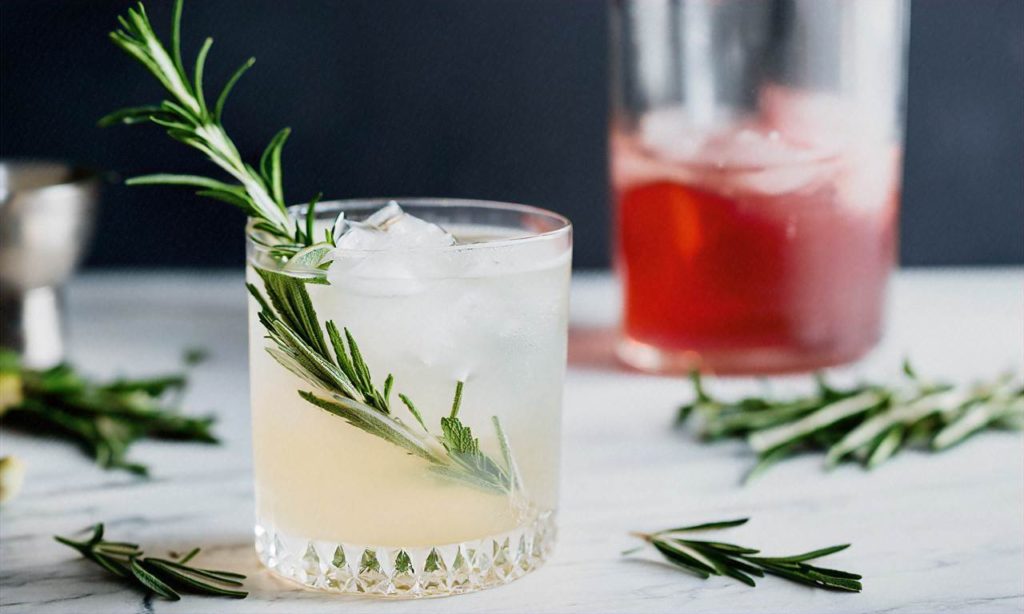
Shrubs are sweet and sour drinking vinegars made by steeping fruit, sugar and vinegar together. They can be mixed into cocktails in small amounts instead of syrups or juices to provide acidity and fruitiness. Shrubs are very versatile for crafting the perfect herb-infused cocktails for any occasion. Try experimenting with some homemade shrubs featuring herbs like basil, rosemary or lavender mixed with the fruit.
Make Your Mixology Seasonal
One fun way to keep your herbal mixology exciting is to shift your herb and cocktail selections with the seasons.
In spring, take advantage of fresh, early season mint and basil. Create bright herbaceous cocktails featuring ingredients like cucumber, lemon, and elderflower.
In summer, use cooling herbs like lemon balm, lemon verbena and fruit shrubs. Make herb-based cocktails light and crisp with ingredients like watermelon, stone fruit, citrus, ginger and floral flavors.
As the weather cools down in autumn, use warming spices, herbs and liquors. Feature ingredients like apple, pear, cranberry and herbs like sage, rosemary and thyme to craft the perfect fall cocktails.
Finally, in winter, showcase herbs and flavors that conjure up the holidays and comfort. Use mulling spices like clove, cinnamon, star anise, nutmeg and allspice. Pair them with ingredients like cranberry, pomegranate, citrus, vanilla, almond and herbs like rosemary.

No matter the season, you can develop unique herb-infused cocktails tailored to what’s fresh and seasonal in your area. This will keep your mixology exciting all year round.
The Final Touches
Don’t forget the final touches that can take your herbal cocktail presentation to the next level. Use a light hand when muddling herbs to prevent over-muddling bitterness. Always taste test as you create a new herbal cocktail recipe. And carefully consider your glassware, ice and garnishes with as much care as you put into choosing your herbs, liquors and other ingredients when crafting the perfect herb-infused cocktails for any occasion.
A custom ice cube with edible flowers, herbs or fruit can provide a visual treat and added flavor. Carefully selected glassware like a copper mug or elegant wine glass also enhances the drinking experience. And a fresh herb sprig, edible flower or fruit slice garnish adds a final pop of color, aroma and taste.
So go forth and starting experimenting with new herbs, homemade mixers like shrubs and bitters, seasonal ingredients and artful presentations! Use the foundations covered in this guide on Herbal Mixology: Crafting the Perfect Herb-Infused Cocktails for Any Occasion and then build upon them with your own creative cocktail alchemy. The flavor possibilities are endless, so have fun seeing what herb and liquor combinations you can conjure up. Soon your home bar will be stocked with an array of unique handcrafted infusions and mixers that you can use to deliver herbaceous cocktails suited to any occasion that are sure to wow and delight your guests!
